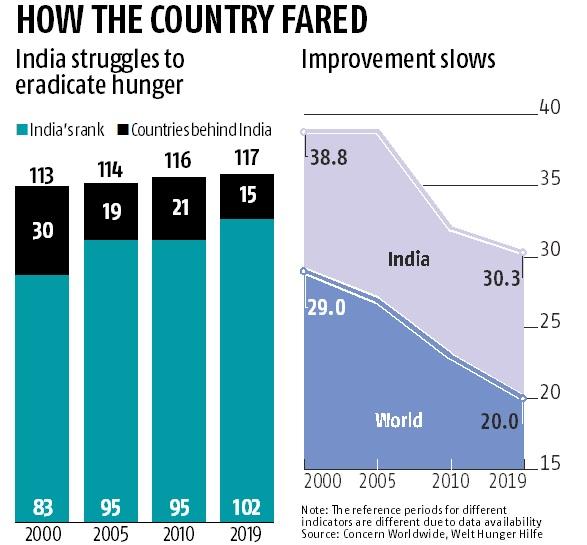Important Facts For Prelims
Global Hunger Index-2019
- 16 Oct 2019
- 2 min read
In the recently released Global Hunger Index (GHI) Report-2019, India was ranked at 102nd position out of 117 countries.
- The report is an annual publication that is jointly prepared by the Concern Worldwide (an Irish agency) and the Welt Hunger Hilfe (a German organization).
- The report is based on four GHI indicators namely, undernourishment, child stunting, child wasting, and child mortality.
Key Findings
- India’s rank has slipped from 95th position (in 2010) to 102nd (in 2019). Over a longer-term duration, the fall in India’s rank is sharper, i.e, from 83rd out of 113 countries in 2000 to 102nd out of 117 in 2019.
- According to the report, India’s child wasting rate was extremely high at 20.8% - the highest for any country.
- Child wasting refers to the share of children under the age of five who are wasted, i.e, they have low weight with respect to their height, reflecting acute undernutrition.
- The share of wasting among children in India marked a steep rise from 16.5% in the 2008-2012 to 20.8% in 2014-2018.
- According to United Nations Children's Fund (UNICEF), child wasting is a strong predictor of mortality among children (under 5 yrs. of age).
- India has demonstrated an improvement in other indicators that includes, under-5 mortality rate, prevalence of stunting among children, and prevalence of undernourishment owing to inadequate food.
- The report also took note of open defecation in India as an impacting factor for health. It pointed out that as of 2015–2016, 90% of Indian households used an improved drinking water source while 39% of households had no sanitation facilities.
- Open defecation jeopardizes the population’s health and severely impacts children’s growth and their ability to absorb nutrients.






